There are several types of food that can be harmful or toxic to chickens. It is important to be aware of these foods and avoid feeding them to your chickens.
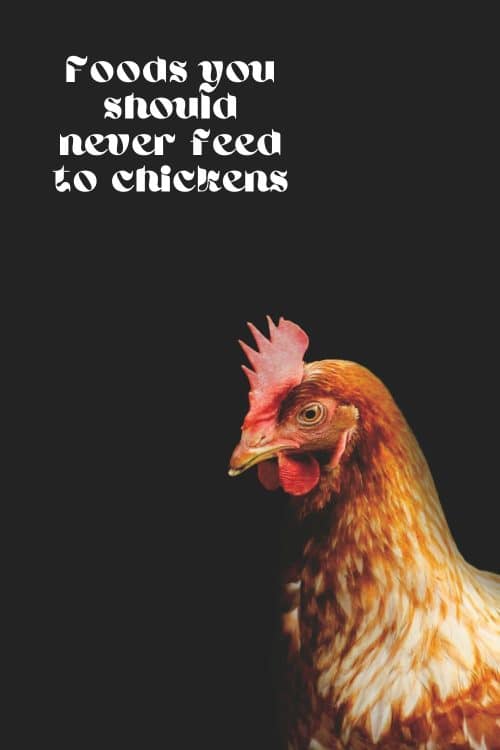
- One type of food that is toxic to chickens is avocado. Avocado pits, skins, and fruit contain a substance called persin, which can cause respiratory and digestive problems in chickens. In severe cases, it can even be fatal. Therefore, it is best to avoid feeding all parts of the avocado to your chickens.
- Another food to avoid is chocolate. Chocolate contains a stimulant called theobromine, which can be harmful to chickens in large amounts. Symptoms of chocolate poisoning in chickens include vomiting, diarrhea, tremors, and difficulty breathing. Don’t give leftover chocolate cake to your chickens!
- Rhubarb leaves contain oxalic acid, which can be toxic to chickens. The stalks of rhubarb are safe for chickens to eat, but the leaves should be avoided.
- Onions and garlic contain compounds that can damage a chicken’s red blood cells, leading to anemia. While small amounts of these foods may not be harmful, it is best to avoid feeding large amounts of onions and garlic to your chickens. Garlic is a common natural dewormer, but if you have an existing parasite issue you will need to treat it with medication. Garlic will not be effective to treat an existing issue.
- Other foods that can be harmful to chickens include uncooked beans or raw beans, uncooked rice, and raw potatoes. These foods contain toxins that can cause digestive problems in chickens. It is best to cook these foods before feeding them to your chickens to remove the toxins.
- There are also several types of plants that can be harmful to chickens if ingested. These include azaleas, rhododendrons, foxglove, and yew. These plants contain toxins that can cause digestive problems or even death in chickens. It is important to keep these plants out of reach of your chickens to prevent accidental ingestion.
For an in-depth article on what chickens CAN eat, click here.
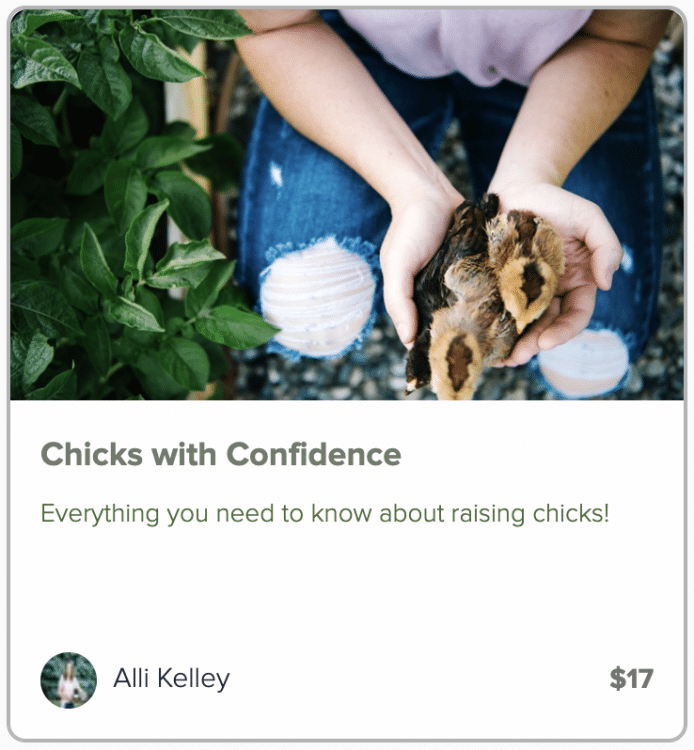
Looking for more in-depth chicken-keeping information? Take my course, Chicks with Confidence!
Chicks with Confidence is a straight to the point, fact based digital course that walks you through exactly what you need to get raising your baby chicks without breaking the bank or causing you to panic everytime they make a weird sounding peep!
Can chickens eat raw or green potatoes?
Raw potatoes, raw potato peels, and green potatoes should not be fed to chickens. Raw or green potatoes contain a toxic compound called solanine, which can cause digestive problems in chickens. Symptoms of solanine poisoning in chickens include vomiting, diarrhea, and weakness. In severe cases, it can lead to death.
It is important to keep in mind that the levels of solanine in potatoes can vary, depending on the type of potato and the conditions in which it was grown. In general, potatoes that are green or have a sprouted appearance contain higher levels of solanine and should be avoided.
Cooked potatoes are safe for chickens to eat, as the cooking process helps to reduce the levels of solanine. It is best to cook potatoes before feeding them to your chickens to remove the toxins.
In general, it is a good idea to provide your chickens with a varied and well-balanced diet that includes a combination of commercial feed and supplements, as well as fresh fruits and vegetables. This will help ensure that they receive all of the nutrients they need to stay healthy.
Can Chickens Eat Green Tomatoes
Yes, chickens can eat tomato plants. In fact, many people choose to grow tomato plants in their chicken coops or run as a way to provide their chickens with a natural source of food. Chickens can eat the leaves, stems, and fruit of tomato plants.
However, it is important to be aware that the leaves and stems of tomato plants are part of the nightshade family and contain small amounts of solanine, which is a toxic compound. While the levels of solanine in tomato plants are generally low and are not typically harmful to chickens, it is best to limit the amount of tomato plant material that your chickens consume.
It is also important to note that the green fruit of tomato plants contains higher levels of solanine than the ripe fruit. Therefore, it is best to wait until the fruit is fully ripe before allowing your chickens to eat it.
In general, it is best to provide your chickens with a varied and well-balanced diet that includes a combination of commercial feed and supplements, as well as fresh fruits and vegetables. This will help ensure that they receive all of the nutrients they need to stay healthy.
Moldy Food and Moldy Chicken Feed
Moldy food can be dangerous for chickens because it can contain toxins that can cause illness or death in chickens. When food goes bad, it can start to grow mold, which is a type of fungus. Some types of mold can produce toxins called mycotoxins, which can be harmful to chickens if ingested.
Ingestion of moldy feed can cause a variety of symptoms in chickens, including digestive problems, weakness, and reduced egg production. In severe cases, it can lead to death.
It is important to regularly check and remove any moldy or spoiled food from your chicken’s feeder to prevent accidental ingestion. If you have a large number of chickens, it is a good idea to use a feeder with a lid to keep the feed dry and prevent mold growth. You should also store your chicken feed in a dry, cool place to prevent it from going bad.
In general, it is best to provide your chickens with a varied and well-balanced diet that includes a combination of commercial feed and supplements, as well as fresh fruits and vegetables. This will help ensure that they receive all of the nutrients they need to stay healthy.
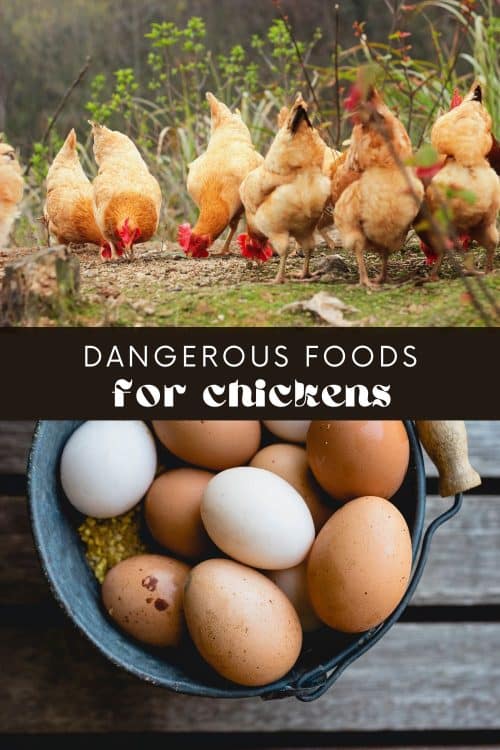
Can chickens eat dairy?
Chickens can eat some dairy products, but it is important to be aware that their digestive systems are not well suited to digesting large amounts of dairy. Chickens do not produce the enzyme lactase, which is necessary to break down the lactose found in milk and other dairy products. As a result, feeding large amounts of dairy to chickens can lead to digestive problems such as diarrhea.
That being said, small amounts of dairy products can be a great source of protein and other nutrients for chickens. Hard, aged cheeses such as parmesan or cheddar can be fed to chickens in small amounts, as they have lower lactose levels and are easier for chickens to digest. You can also offer your chickens small amounts of yogurt or cottage cheese, as the bacteria in these products can help to aid digestion.
It is important to keep in mind that dairy products should only be fed to chickens in moderation, as a supplement to their regular diet. The majority of a chicken’s diet should consist of a well-balanced commercial feed and supplements. By following these guidelines, you can help ensure the health and well-being of your chickens.
Can chickens eat coffee grounds?
It is not recommended to feed coffee grounds to chickens. Coffee grounds contain caffeine, which is a stimulant that can be harmful to chickens in large amounts. Symptoms of caffeine poisoning in chickens include hyperactivity, increased heart rate, and difficulty breathing. In severe cases, caffeine poisoning can lead to death.
It is important to keep in mind that chickens have a much lower tolerance for caffeine than humans do. Even small amounts of coffee grounds can be harmful to them. Therefore, it is best to avoid feeding coffee grounds to your chickens.
Save your coffee grounds for the compost pile instead of the chicken coop.
Can chickens eat apple seeds?
Yes, chickens can eat apple seeds.
Apple seeds contain small amounts of cyanide, which is a toxic compound. However, the amount of cyanide in apple seeds is generally not enough to be harmful to chickens. Chickens are able to safely consume and digest small amounts of apple seeds without any negative effects.
That being said, it is important to keep in mind that apple seeds should be fed to chickens in moderation, as a supplement to their regular diet. The majority of a chicken’s diet should consist of a well-balanced commercial feed and supplements.
To be on the safe side, it is a good idea to remove the seeds from apples before feeding them to your chickens, as the seeds can be a choking hazard. You can also chop the apples into small pieces to make them easier for your chickens to eat. By following these guidelines, you can help ensure the health and well-being of your chickens.

Looking for more in-depth chicken-keeping information? Take my course, Chicks with Confidence!
Chicks with Confidence is a straight to the point, fact based digital course that walks you through exactly what you need to get raising your baby chicks without breaking the bank or causing you to panic everytime they make a weird sounding peep!
Can chickens eat citrus fruits?
Yes, chickens can eat citrus fruits such as oranges, lemons, and grapefruits. Citrus fruits are a good source of vitamin C and other nutrients that can be beneficial for chickens. They can help to boost the immune system and promote overall good health in chickens.
However, it is important to keep in mind that citrus fruits should be fed to chickens in moderation, as a supplement to their regular diet. The majority of a chicken’s diet should consist of a well-balanced commercial feed and supplements.
In general, it is a good idea to remove the seeds and peel from citrus fruits before feeding them to your chickens.
The seeds can be a choking hazard, and the peel can be difficult for chickens to digest. You can also chop the fruit into small pieces to make it easier for your chickens to eat. By following these guidelines, you can help ensure the health and well-being of your chickens.
Can chickens eat raw eggs?
Yes, chickens can eat raw eggs. In fact, many chicken keepers choose to feed their chickens raw eggs as a source of protein and other nutrients. Raw eggs can be a nutritious addition to a chicken’s diet, and many chickens enjoy eating them.
However, it is important to be aware that raw eggs can carry bacteria such as Salmonella, which can cause illness in humans and animals. It is important to handle raw eggs with care and to wash your hands thoroughly after handling them to prevent the risk of bacterial contamination.
Acceptable Treats for Chickens
There are many types of treats that are suitable for chickens. Feeding chickens table scraps is a great way to cut down on food waste and provide them with healthy snacks. Some examples include:
- Fresh fruits and vegetables: Chickens can eat a wide variety of fruits and vegetables, including apples, berries, leafy greens, green beans, bell peppers, spinach, and peas.
- Cooked grains: Cooked grains such as rice, oats, and quinoa can be fed to chickens as treats.
- Mealworms: Mealworms are a high-protein treat that chickens enjoy. They can be purchased at many pet stores or online.
- Sunflower seeds: Sunflower seeds are a tasty treat that chickens enjoy. They are high in protein and can be fed to chickens in moderation.
- Kitchen scraps: Many types of kitchen scraps can be fed to chickens as treats. These include leftover cooked vegetables, stale bread, and pasta.
It is important to keep in mind that treats should be fed to chickens in moderation, as a supplement to their regular diet. The majority of a chicken’s diet should consist of a well-balanced commercial feed and supplements. By following these guidelines, you can help ensure the health and well-being of your chickens.
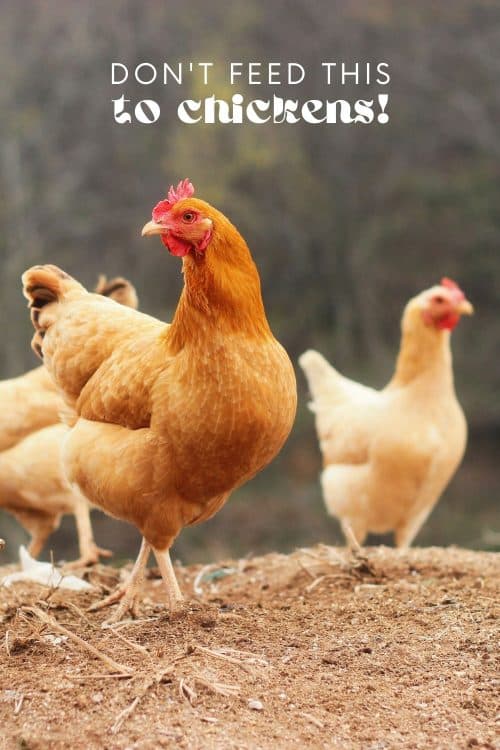
What should chickens eat?
Chickens should be fed a complete feed balanced for their needs, either laying hen feed or meat bird feed. Commercial chicken feed is balanced by professional poultry nutritionists to ensure they provide your backyard chickens with all the nutrients they need to thrive.
They have a specific percentage of protein, energy, vitamins, and minerals. This kind of complete feed should be easily accessed by your chickens in their chicken coop 24/7. Even free-range chickens will need to be offered a complete, balanced feed at all times. They will not be able to meet all their nutritional needs from foraging alone.
Chickens should also be provided with a readily available source of calcium, like oyster shells. This ensures that your laying hens will have enough calcium to lay eggs with strong shells. This should also be given free access, 24/7.
In general, it is best to stick to a well-balanced diet of commercial feed and supplements for your chickens.
Avoid feeding your chickens any unfamiliar or potentially toxic foods, and be sure to remove any moldy or spoiled food from their feeder. By following these guidelines, you can help ensure the health and well-being of your chickens.

Looking for more in-depth chicken-keeping information? Take my course, Chicks with Confidence!
Chicks with Confidence is a straight to the point, fact based digital course that walks you through exactly what you need to get raising your baby chicks without breaking the bank or causing you to panic everytime they make a weird sounding peep!
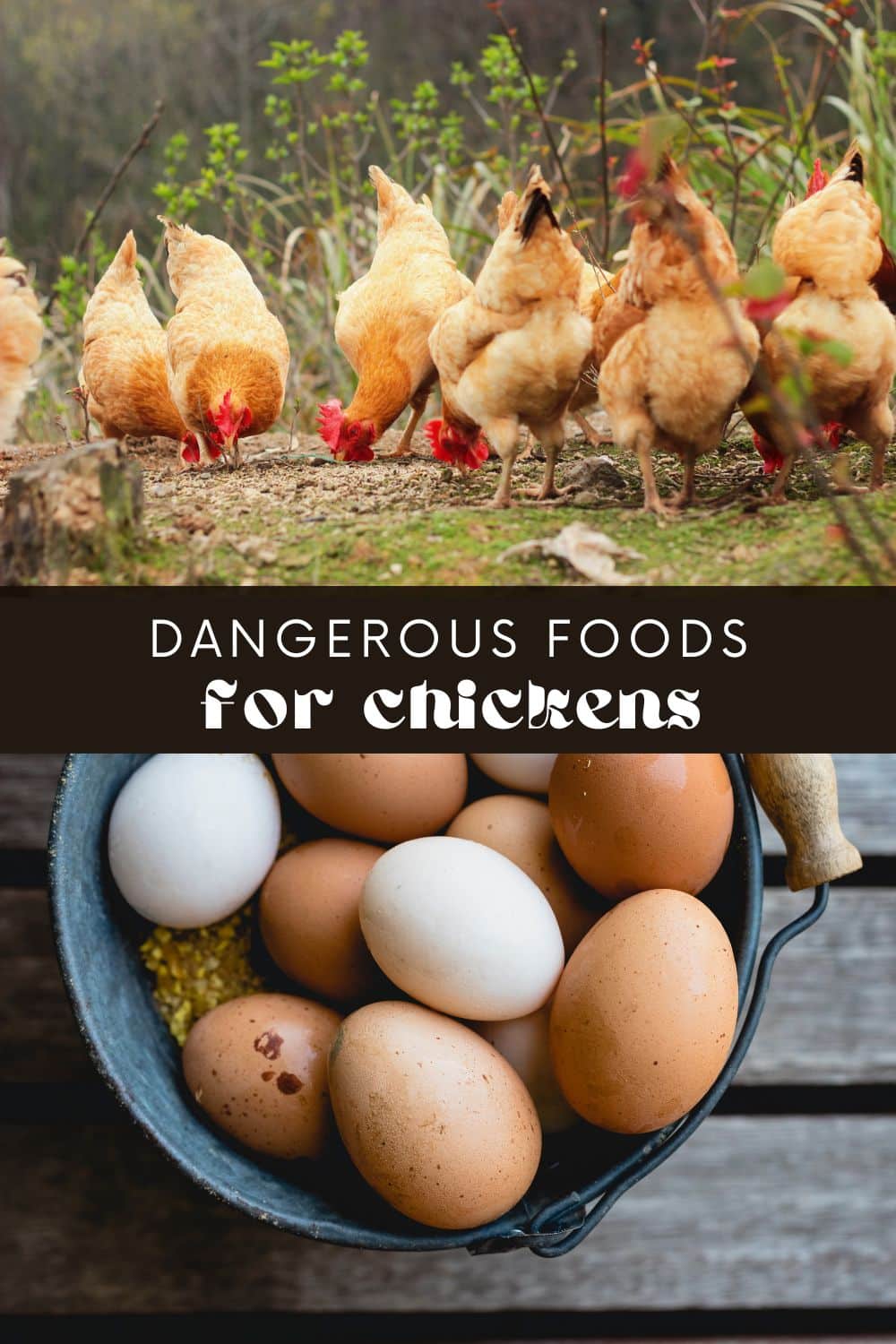
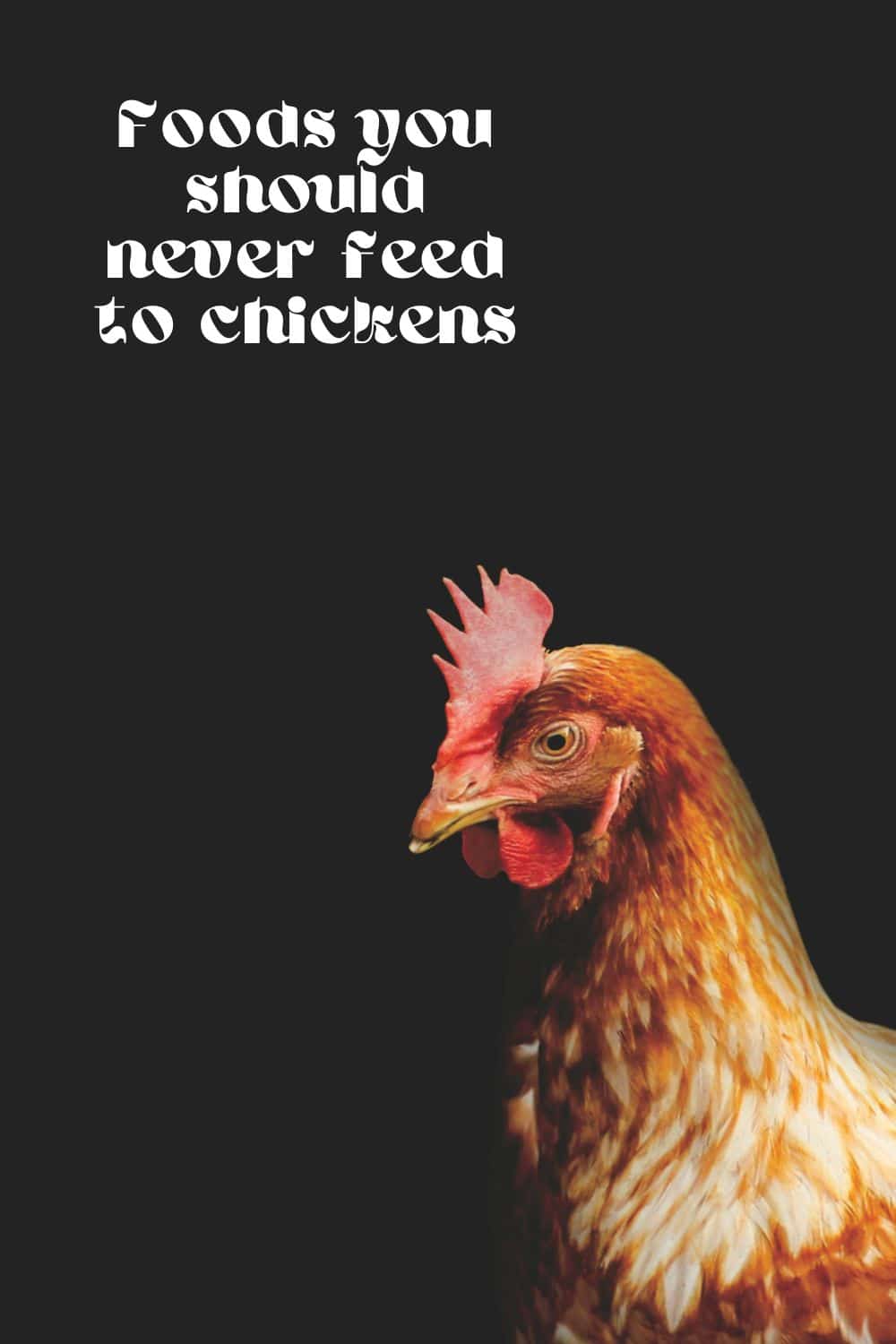
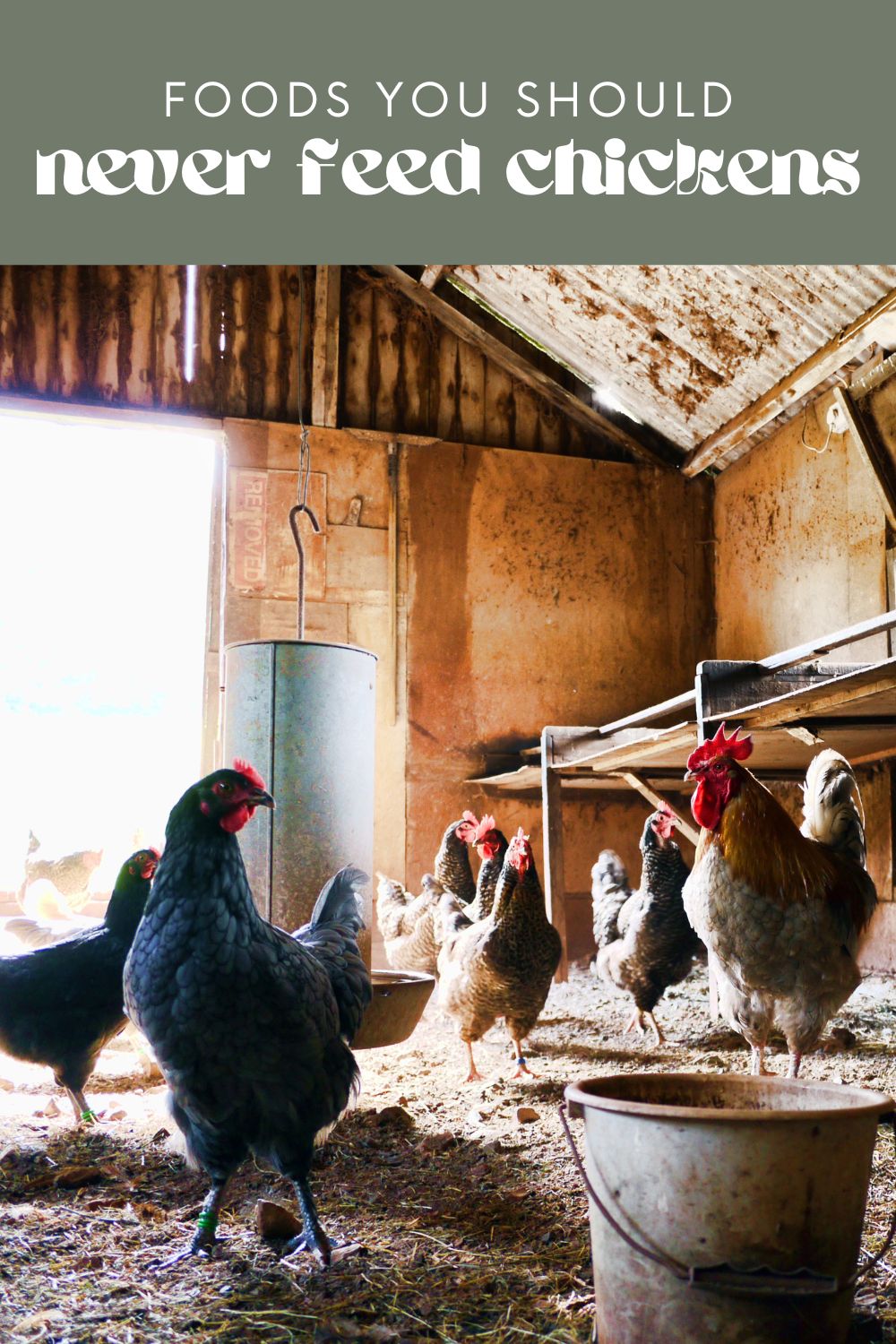
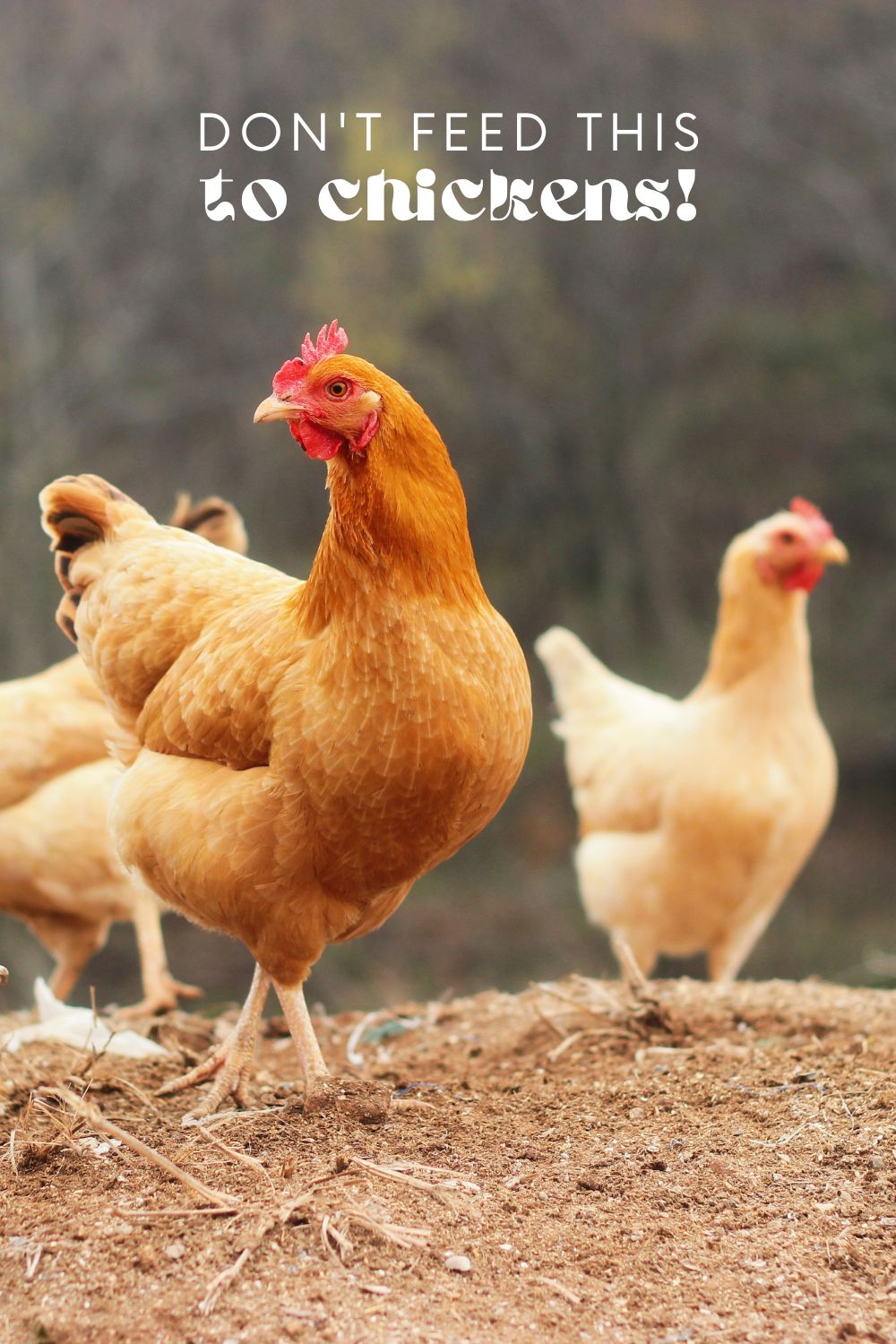
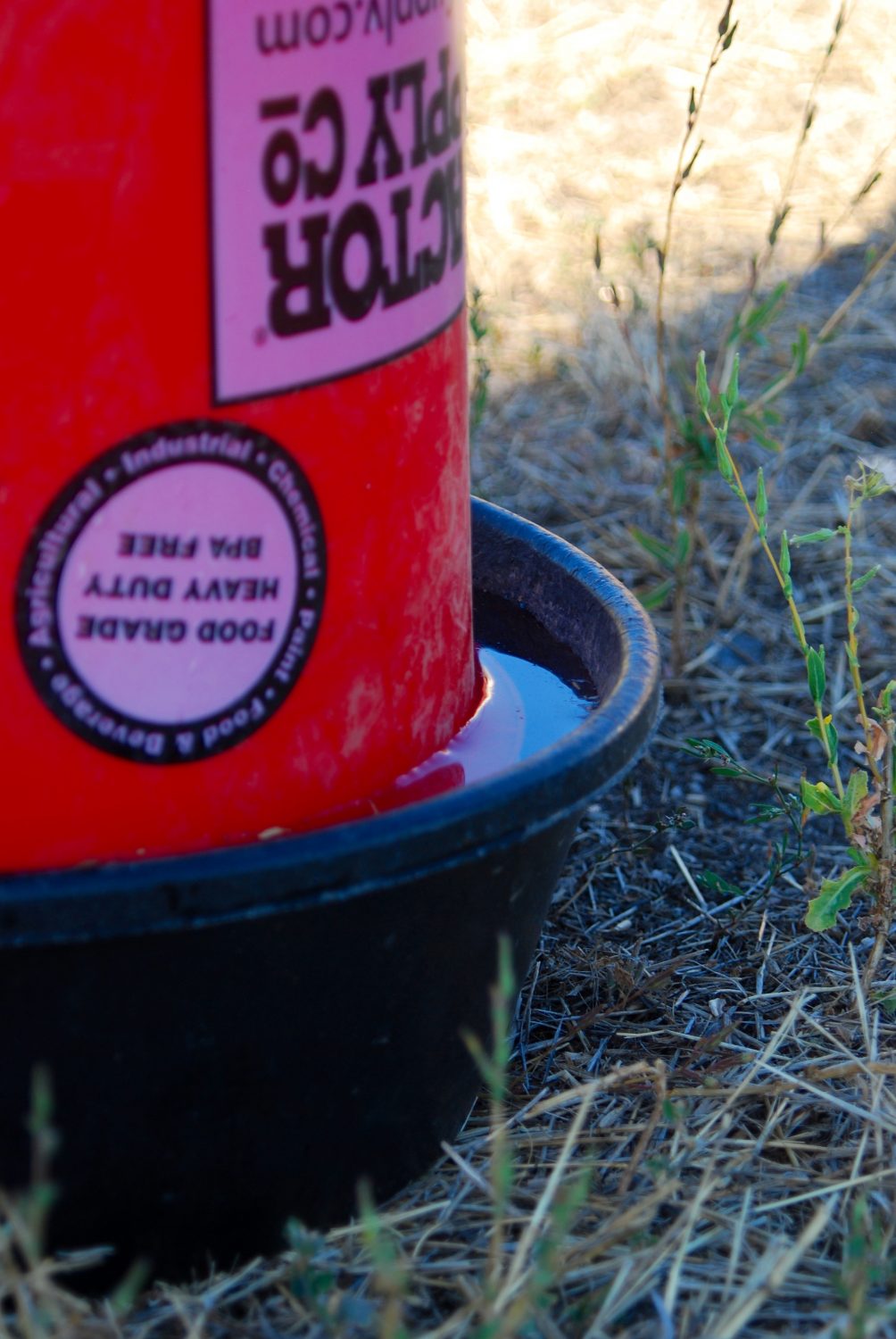
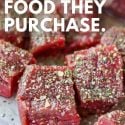



[…] What can’t chickens eat? […]